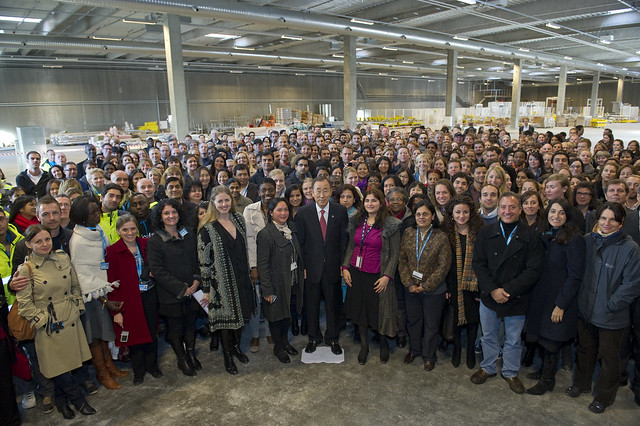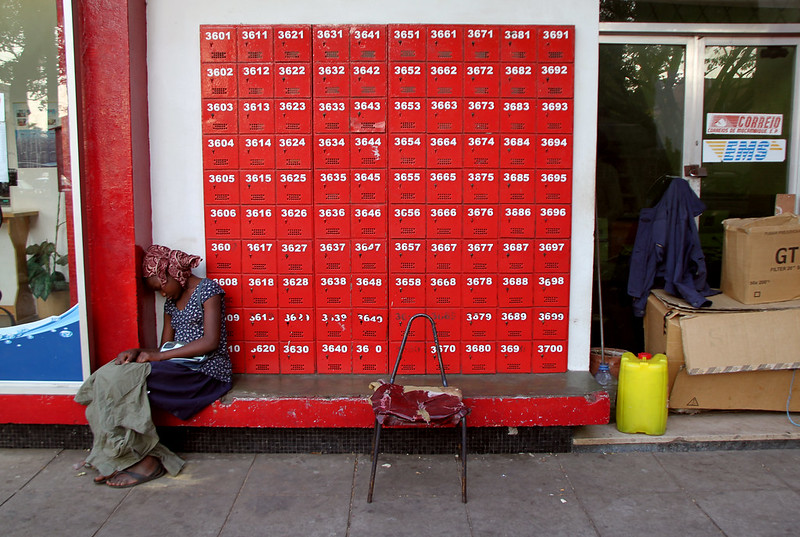
About twice a month, I receive an email from a stranger who dreams about a job with the UN. They usually find my blog through the article where I explained how to sign the P11 form electronically, which apparently was an information gap and which has gotten huge response.
The emails usually follow more or less the same structure:
Dear Caroline,
You don’t know me and I am sorry to bother you. I would like to thank and congratulate you on your important work and engagement for the human society/children/future of the world/the poor and vulnerable/etc. Myself, a highly educated, skilled and experienced Medical Doctor/Lawyer/Social Scientist/Humanitarian Worker/Human Rights advocate/etc. from a developing country in Africa/Asia/Latin America, have been applying for UN jobs for many years with no luck.
It is my goal and dream to be a part of the United Nations, and I would be very thankful if you please could give me some advice or let me know if you have any opportunities with your office or networks.
With best regards,
X
Always courteous, hopeful and a sometimes sad, these emails break my heart a little as I see the potential or at least good efforts of these individuals – but can’t do much about their situation.
First of all, I need to clear out that I am not the right person to ask for advice as I don’t have a permanent UN contract myself. I’m aspiring for one, of course, but until then I’m a consultant, meaning that I travel to where I am needed and work within the area where I best can contribute. Basically, if there is a gap of some sorts/a problem/a need for expertise within my area/etc. in an office, I get a temporary contract to do my thing for the time needed, which usually is a couple of months. This is great as it gives me a multifaceted experience, valuable insights into different conditions and countries, and I love the fact that it is exciting, flexible, fruitful and inspiring. However, being a consultant also implies a huge amount of uncertainty and the always relevant risk of falling between contracts, which is the gap where I’m forced to live off my savings, and where I am just as unemployed and job hunting as the individuals who send me those emails.
I’m aware of how hard it is to continue applying for jobs and write to people when you mostly don’t even get one of those automated “Dear Madam: Thanks, but no thanks.” emails. However, knowing how important it is to initiate personal contact, I always try to answer and contribute the best I can to the emails I receive, if only to inspire and give suggestions – which also is why I decided to write this post as it will save me a huge amount of time, reach out to more people and allow me to be more elaborate.

Having that said, I do acknowledge that I have managed to find my way into the system and that I have obtained a certain amount of understanding of the procedures, requirements and dynamics of the recruitment processes. Not saying that I have the answer to how to score a job with the UN, nor that I have any concrete solutions for the individuals who are emailing me, but that it does actually get easier once you get a foot in the door, which should be the main goal of any outside applicant, and that I believe that a combination of relevant skills, persistent and strategic efforts, good timing and a strong network is what one mainly needs.
Here is my take on a couple of suggestions. They are of course personal and based on my considerably short experience of reading applications, recruiting interns and of being recruited myself, so if somebody with better insights has anything to add, your contribution is more than welcome.
Skills:
You need a CV that is strong and relevant.
An academic degree is a must for most positions and internships. A bachelor is usually enough when applying for internships and administrative (G) positions, but a master within a relevant area is mostly necessary when applying for consultancies and international professional staff (P) positions. There are all sorts of areas within the UN system, so you can study something that you’re actually interested in, just make sure that it is an internationally recognized degree and not something completely irrelevant.
Languages are of very high importance and the requirements differ depending on the country you are applying to. Apart from the local language (not always), you will need to know English and/or French fluently, and then preferably at least one of the official UN languages. (Arabic, Chinese, Spanish, Russian.)
International work experience is very valuable. Engagement with non-profit organisations as well as international NGO’s shows that you have an interest in development and that you are driven by the cause and not necessarily by the image/status/money that you might believe a UN job can provide. If applying for positions in the field, previous experience shows that you have the psychological resilience to endure hardships. Specific skills and long experience in a certain area is of course of great value, and if you somehow have managed to combine it with activities that show your engagement for the values and focus of the agency you’re applying to – you should be a great asset.
Finally – none of this has any value if you can’t present it properly. Work on your CV and adjust it for each position you apply for, same goes for applications – I’ve read applications so generic that it was impossible to find a connection to the organization. Take your time, read through the vacancy announcement five more times to make sure that you covered all the requested requirements, run the spell checker again, and check that every single thing you mention is relevant for the position.



Strategy and Network:
Be proactive! I am convinced that contacting people and following up on applications is the way to go, especially when it comes to the most important part of job hunting – getting your foot in and spreading little seeds of interest. If you are asked for something, act immediately. If you can make up relevant questions to ask and initiate personal contact – call and show your interest. It doesn’t necessarily have to give you the job you have applied for, and usually doesn’t, but if you manage to introduce yourself properly, make a lasting impression, or in some other way convince the right person that you have skills that are of value, they might pass you on to another agency, keep you in mind for the next time, or even contact you when they hear of something relevant. True story.
Any person can choose to help you if they see that you have a skill that might be relevant for somebody else. Your network is your most valuable asset. A friend once told me: “Your network is not just about who you know, it’s about who you know knows.” Your main job is to let them know that you are on the market. Connecting people is the core of the development world as there is always a need for skilled professionals, there will usually still be a recruitment process, but it is often hard to find the right capacity and obviously safer to hire somebody based on a good recommendation.
As to getting your foot in. Internships are the easiest entry point. Unpaid and not always with the best conditions, they give you the opportunity to explore the system from the inside, do that valuable networking and learn as much as possible about the processes. Other interns and staff colleagues are great inspiration as they share your ambitions and have been in the same place as you once. Exchanging ideas is extremely valuable, and if you’re very lucky you might find a fantastic person with great experience who is willing to mentor you, inspire, and give their assurance to your future employers.
Timing:
Yes, you need a fair amount good timing which is a part you can’t really control. Or, more precisely, you need to be in the right place at the right time. In Mozambique last year, I was applying for a position at WFP and while visiting the office I had an informal chat with the communication officer in charge, mentioning my aspiration to go to the field to photograph and write an article for the Swedish UN Magazine, Världshorisont. A couple of days later I got a phone call from the UNICEF office, they were looking for somebody to document their projects in the field with stories and photography for a booklet. “I have been told by several people that you are a good candidate for this consultancy.” I was as surprised as I was happy – and sent my application an hour later.
To clarify, I don’t really believe in luck as such. It might look like a clear example in this case, but was in fact a result of many weeks of letting people know that I would be looking for a job and what kind of ideas I had. Of course, I was lucky that there was an opening at that exact moment, and that it was followed by another opening that was very relevant for my experience, but I am convinced that scoring a job depends on your ability to do a good job, get good recommendations, and persistently and optimistically strive for your goals, rather than luck and prayers.
Making sure to be at the right place at the right time – instead of just waiting, that is.

And to actually find the jobs and getting an idea of what kind of areas there is a need in at the moment, my favourite resource is that of an acquaintance of mine, Sebastian Rottmair, who runs the fantastic and very useful web portal UN Job List. On the website, Sebastian shares all internationally advertised UN vacancies and often also internships and temporary assignments. There is an option to define agency/duty station/grade, or even write keywords, for a weekly email alert containing the jobs that fit your search criteria. I’ve been subscribing to this since forever.
From my part, this is the best I can do in terms of giving some general advice. There is a detailed wiki on the topic that explains the whole process and gives some very good tips and entry points: “How to get a job with the United Nations”
Also, I am convinced that many of you have thoughts and ideas to add – please feel free to contribute and discuss in the comment section below.
And best of luck with your applications!

Update:
Dear all, thank you very much for your emails and positive feedback, I am happy that you enjoyed reading this post – unfortunately, as much as I would love to be able to help you out, find you a job, hire you, or connect you with a relevant colleague or UN Agency – I can’t do any of that. If you wish to ask a general question about this topic, feel free to do so under this post to share with other people who might be wondering the same, but please don’t email me your personal questions, curriculums and job applications, or add me on Facebook, as I have no authority to hire people. By writing this post, I wanted to inform about options but also illustrate that I didn’t have time to answer all emails and that I wasn’t the right person to ask. I recommend you to contact your local NGO’s and civil society organizations who work within many different areas and always appreciate and need support, or explore the option of a UNV or Online UN Volunteering.
You are of course still welcome to contact me about other matters. Just no more job applications, please! :)














